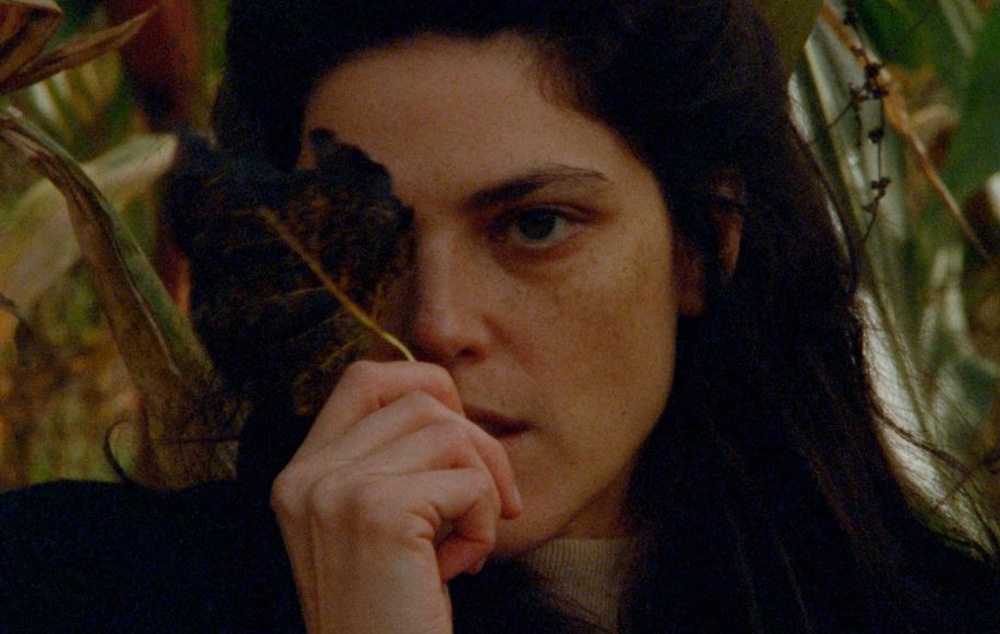By the end of “Invention,” John Hernandez has left something real behind, though you wouldn’t think so at first when his daughter Carrie (Callie Hernandez) arrives to collect his things after he passes. An executor (James N. Kienitz Wilkins) informs that he “had a different approach to personal finances,” operating businesses under a number of different aliases and while there may not be much of a monetary inheritance, there is a patent to a curious machine he had in the back of his house, an electromagnetic healing device that was prevented from mass distribution in part by the FDA and just as likely his own lack of due diligence. While the actual machine and any paperwork he filed for it comes as a surprise to Carrie, the concept of it can’t when this was the kind of highly questionable alternative therapy apparatuses he was always hawking, putting a distance between himself and his family when it’s where he spent most of his time and energy and even more so with the feeling that it was towards something so clearly fraudulent.
An actress of considerable range in such films as “La La Land” and “Jethica,” Hernandez isn’t playing herself, or at least not exactly in “Invention,” but the clips interspersed throughout “Invention” really are of her father John, who showed up on the kind of late-night informercials you might watch at 2 a.m. on cable, pushing stress-relief gadgets in talk show settings. In the absorbing and playful nonfiction/narrative hybrid hatched by Hernandez and Courtney Stephens, there is plenty of fun in confusing the issue in small inconsistencies such as when Carrie is referred to as “Ms. Fernandez” by the executor, though chyrons on the archival material clearly refers to Hernandez to deeper cuts such as the recruitment of formal anarchists such as the aforementioned Wilkins and Joe Swanberg and Caveh Zahedi in supporting roles as the eccentrics that inevitably were in John’s orbit that Callie has to visit on her way to learn more about the device he got the patent for.
However, the chicanery ultimately pays serious dividends as Carrie settles into her father’s house, mostly alone in her thoughts while dealing with the unforgiving nature of settling her father’s affairs, regardless of her feelings towards him. To survive the experience, she keeps her cards close to the vest as she talks to people who are either self-absorbed or simply doing their job, but she starts to open up to Sham (Sahm McGlynn), the nephew of an antique dealer (Tony Torn) who seems to be the only one in this sleepy provincial town who shares the same age and attitude as her, and while the film is straightforward dramatically, Stephens and Hernandez shrewdly insert interstitials not just of real-life footage of John, but static scenes of a candle accompanied by behind-the-scenes banter that would seem to correspond to the layers of reality that Carrie has to push past to attain some understanding of who her father was, allowing an audience to process their experience at the same rate that Carrie engages with others and creating the same level of disorientation.
“Invention” doesn’t ever suggest John was honorable or misunderstood, but it becomes an unexpectedly profound tribute when Carrie offers one particularly tantalizing tidbit on a date with Sham, talking about her father’s spiritual journey from being born into a family of Jehovah’s Witnesses before trying all kinds of other religions on for size, a path that would eventually lead to all kinds of other wild beliefs in conspiracies and the efficacy of lasers as a major part of his devices. In a general sense, Carrie describes an eternal search for truth that proved elusive, unwittingly connecting with her father at least in one sense now when she’s on a similar journey in an entirely different way and with so many blurred lines between what’s to be believed and not, “Invention” reaches beyond facts to offer something more emotionally nourishing when it takes some fiction to coax out a story that makes sense for both those behind the camera and in front.
“Invention” does not yet have U.S. distribution.




